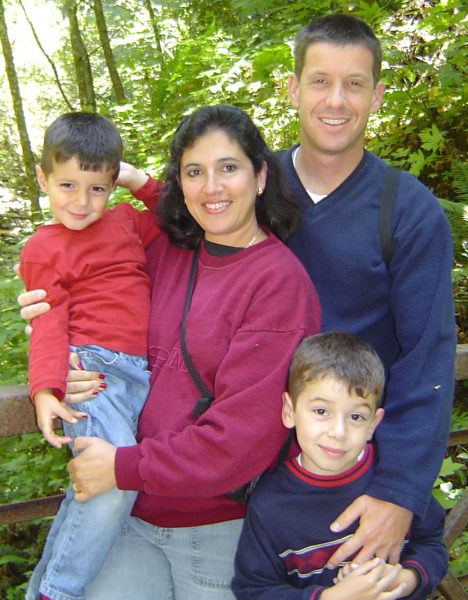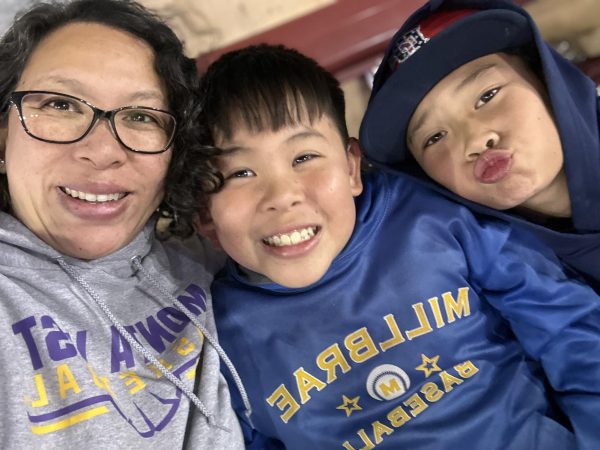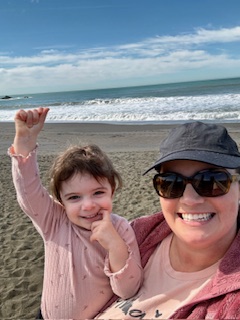When his oldest son, now 26 years old, entered high school, math teacher Scott DeRuiter found himself approaching his career differently. Listening to his son’s teacher at back-to-school night, DeRuiter realized that he wanted to connect with his son’s teachers rather than solely learning about technical aspects of their classes.
“I realized that I, as a parent, wanted to hear something about the teacher that was personal,” DeRuiter said. “I didn’t want to hear how the class was run or the person’s credentials. I wanted to see the human side of the teacher I was entrusting my son to. So I changed how I did back-to-school night. I talk about my family, I talk about things that I like to do outside of school, because I try to tailor it to what I, as a parent, would want to see in a high school teacher.”

Similarly, after her children, aged 11 and 13, entered school, English teacher Jireh Tanabe changed the way she approached communication with parents. Email updates from her children’s teachers helped Tanabe stay up to date with what her children were learning in school, and helped reassure her that their teachers viewed her as a “partner in her kids’ education.” Subsequently, Tanabe decided to implement a similar practice in her own classroom.
“Before, I was more on the defensive with parents,” Tanabe said. “But after having kids, I’ve been sending unit updates for every single unit that I teach, outlining the book, what they can expect kids to be doing, what the summative assessment is and what they should look for at home if they want to be involved. I think that has opened channels for a lot of parents to be understanding not just what I do, but what their kids are doing and not feel like they’re in the dark.”
DeRuiter found that having kids helped him interact with both parents and students, particularly when they are struggling. Seeing his kids’ “growing pains” as they went through their teenage years helped DeRuiter empathize with students having their own issues and help them through it. Likewise, math teacher Melinda Gaul found that becoming a parent helped her communicate and facilitate conversations with students better.
“Before, I didn’t focus as much on helping students learn how to talk to each other,” Gaul said. “But I learned I had to teach my kids skills like that. Communication is something that I think we hope people innately know, but they don’t. It is a skill that we have to teach. So now I have these comment starters and teamwork guidelines. I’ve definitely done more since I’ve had my kids.”
Conversely, English teacher Melissa Clark believes that being a teacher will allow her to become a more empathetic parent. Supporting her students and resolving conflicts between them have developed her personality and attitude towards approaching obstacles. She believes this mindset will improve her ability to help her daughter, who is currently about one-and-a-half years old, through problems.
“I’ve been thrown so much as a teacher, so over the years, I’ve learned to handle it,” Clark said. “So I think once she hits any problems, like getting picked on or disliking someone who’s sitting in her group, I think because I’ve handled that in the classroom, I can be inspired by my teacher role and help guide her through issues that I may have already experienced or witnessed by being a teacher.”
As her daughter gets older, Clark anticipates that her career might result in her having higher expectations for her child’s teachers. However, she believes that her own experiences will allow her to empathize with her daughter’s teachers. Tanabe, who believes in setting high standards to help her students “clearly express in writing what their thoughts are,” utilizes her own teaching philosophy and experiences when partnering with her children’s teachers.

“I want them to take ownership of their education, so I’m behind the scenes helping the teacher help them,” Tanabe said. “I always advocate that they email their teachers. When they’re in sixth grade, I’ll draft emails for them and say, ‘OK, do you understand how or why I wrote what I wrote to your teachers, and the way you should be speaking to your teachers?’ As the year goes on, it becomes their turn to write to their teachers. My eighth grader now can advocate for himself.”
Gaul, like Tanabe, tries to stay out of communication between her children and their teachers. She tries to let her kids, who are 13 and 15, resolve any issues with their teachers on their own before getting involved. She prefers that her kids’ teachers don’t know she’s a teacher to minimize any pressure they might feel upon learning about her career, and aims to interact with them “as a parent and not a teacher.”

Tanabe recognizes that the time commitment of being a parent means she must be more productive at work — since becoming a parent, Tanabe has grown to be much more efficient in grading and less prone to “letting work sit” if she has things to grade. Gaul, too, has found that becoming a parent has not only helped her with work-life balance but has also allowed her to be more forgiving of her mistakes.
“I used to work really long hours to try and make sure that I would never make mistakes, but I don’t do that anymore,” Gaul said. “I give myself a time limit, and my work is good enough when I finish. Sometimes good is good enough. And if I made any mistakes, it’s OK because students make mistakes. I think it’s good for me to model making mistakes.”
For Clark, the additional time commitment of being a parent also included four months of maternity leave in 2023. She reminisces fondly on being able to spend time with her daughter for the few months after her birth, especially during summer break. When the school year started, Clark found it “very strange” to not be at work, as she was still on maternity leave. She felt pressure to prepare for the upcoming school year and found herself checking emails even though she didn’t have to.

“Coming back in November was really hard,” Clark said. “I felt like I wasn’t able to really get to know any of my students super well because I missed the first part of school, which is where you establish connections with your students. I do feel like there were some classes that were checked out, especially my seniors, when I came back.”
Eventually, Clark was able to form a community with her students after making it a point to implement more getting-to-know-you exercises throughout the year that she typically does in August and September. She notes that ultimately, being a teacher and a parent is challenging, as it requires constant vigilance, but is also rewarding.
“It’s so much fun, but I will say, being a teacher means being ‘on’ all day — having to teach, planning and grading, and then going home to take care of my daughter,” Clark said. “So I feel like there are some days where I don’t get a break, but it is worth it.”









